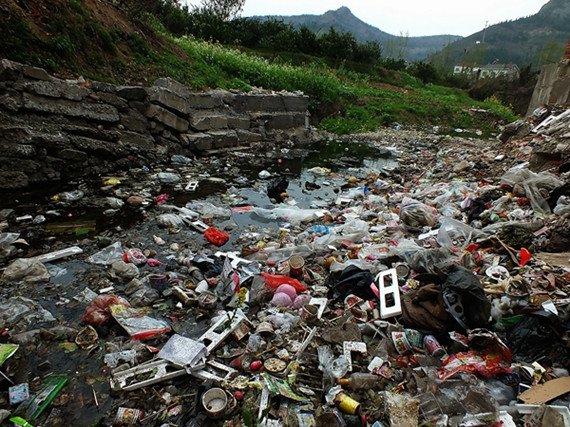
Rubbish is scattered across a tributary of the Yangtze River in a rural area of Yichang, Hubei province, causing serious pollution. Every summer, the waste is washed down to the Yangtze River by floodwaters.(LIU JUNFENG/CHINA DAILY)
The quality of China's water resources has been in decline for several decades. Now, measures are being introduced to return the country's lakes, rivers and subterranean supplies to health. Xinhua News Agency reports.
From dirty laundry to tainted wells, the strain on China's water resources is being felt nationwide after years of industrialization have left the country high and dry. Farmer Jiang Delan lived a quiet life near Bengbu city in Anhui province until an industrial park near the Sanpudagou River tainted her village's water source.
"Now the fish from the river are inedible and they stink when cooked," Jiang said. "The water quality has worsened since the establishment of the industrial park. It makes the air smell and the water in our well tastes strange."
While the village once relied on money earned from growing rice, the residents' crops are now rejected at the local market because they have an unpleasant taste.
"It does not surprise me. How can rice taste good if it is irrigated by such polluted water?" Jiang asked. "Now we only grow crops that depend less on water."
Her village is not the only one facing a crisis. Water shortages and problems related to contamination have become widespread in recent years as industrialization and urbanization take their toll.
White clothes are history
Sanxianhu township in Hunan province, named after the once pristine Sanxianhu Lake, was once famous for its abundant clear water.
But the quality began slipping toward the end of the 1970s, when industrial and agricultural wastewater was discharged directly into the lake. "Sometimes the water is black. It's impossible to drink," local resident Li Qinglan said.
Around 1980, the residents dug a well to access clean water, but other problems arose.
"At that time, girls liked to wear white dresses. But the dresses turned yellow after being washed in the tap water. White clothes soon became a rare sight in our town," Li said.
Several years later, experts discovered excessive iron and manganese content was to blame for the dirty laundry.
"The iron content in the water is 84 times higher than the national standard, and manganese is 25 times higher," said Zhao Yong, deputy head of Sanxianhu's water administration station.
In 2008, the provincial finance department funded a water-processing plant to filter the iron and manganese from the well water, but the content was still too high, making the process slow and ineffective.
In response, the villagers created their own filters by placing buckets filled with sand and cloth under their taps. "Now, everyone in the village has one," Li said.
The poor water quality has led many of the younger generation to abandon the village and seek a better life elsewhere. A new water processing plant is under construction and is expected to improve the water quality and increase supply, but many worry that it is too late.


















































